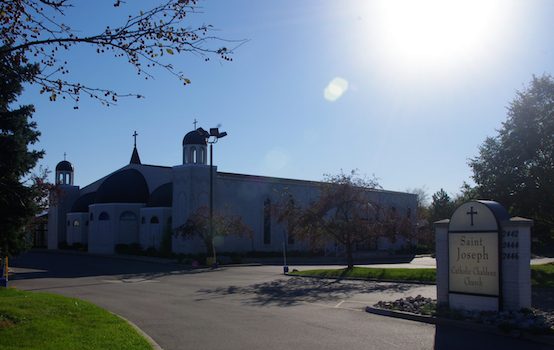Iraqi-American Christians Pray, and Protest, for Peace

As the Islamic State forces northern Iraq’s religious minorities—Christians, Shia Muslims, and Yazidis—to flee, convert, or die, the United States has begun dropping humanitarian aid as well as bombs in an effort to stave off genocide, despite many Americans’ trepidation at getting involved in Iraq again. But many Iraqi-Americans, especially members of the Chaldean Catholic community, have long been protesting and praying for some kind of action.
Chaldean Catholics have a long history in the United States, but their numbers have been growing in past decades as they have fled from aggressors in Saddam Hussein’s Iraq and the Islamic State alike. The American Spectator’s Lucy Schouten recalled their exodus:
Most [U.S. refugees] joined the Chaldean Christian community in Michigan, which began in the 1870s. They had helped build the automobile industry, saving factory wages to bring family members to the land of opportunity. The Detroit community of Chaldeans now numbers 200,000 and has associations for every profession from pharmaceutics to CPAs.
The Iraqi Christians were an enterprising group and established smaller communities in San Diego, Chicago, Arizona, and Las Vegas, while maintaining ties to faith, family, and their home country community.
That community continued to grow and flourish even after the war ended, although, as Schouten put it, “most Americans would not now call Detroit a land of opportunity.”
Now, the community has come together to support family and friends across the ocean. The federal building in downtown Detroit has seen several rallies over the past two weeks. An August 1 procession saw a thousand Iraqi-Americans pray for peace while carrying a large cross around Mother of God Chaldean Church in Southfield. The Detroit Chaldean community has raised tens of thousands of dollars for humanitarian aid in Iraq through parish collections and a new online diocesan initiative, HelpIraq.org.
Detroit Chaldeans have partnered with their smaller, but just as active, brethren in California to raise awareness. San Diego’s “Little Baghdad” neighborhood in El Cajón is home to the second largest Iraqi-American community, including vibrant activists from protest rappers to visiting Iraq-based nuns. Many members of the community have family and friends suffering back in Iraq, and local doctor John Kasawa has noted an uptick in anxiety and depression in the neighborhood as the violence takes a toll “on the collective conscious.”
Little Baghdad’s most visible leader is local entrepreneur and Ending Genocide in Iraq spokesman Mark Arabo, who had been working with Congress and the administration on anti-genocide action and humanitarian aid for months before news of the airstrikes came last week. He now plans to go to the United Nations, where he hopes to convince leaders to give asylum to the nearly half-million newly displaced Iraqi Christians. Meanwhile, some are already preparing for new arrivals in San Diego.
Arabo has described the decision the U.S. faces in Iraq as “an honorable predicament.” In considering the extent of military intervention, the U.S. is “specially positioned to be viewed as a failure for foreign inaction, and ‘imperialist’ for our willingness to act,” he said. “I tend to view our foreign role as a nation of great power, blessed with a moral obligation to enact change on a global scale. This, I must stress, is a blessing.”
Not all members of the Chaldean community agree. “We do not want to see American [sic] involved in a third war in Iraq, Gulf War 3.0. We don’t want that,” Bishop Bawai Soro of the San Diego Chaldean diocese told local news. “At the same time, we want ISIS to be stopped.”
Comments